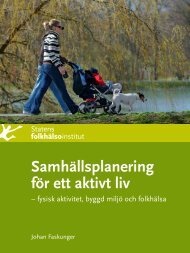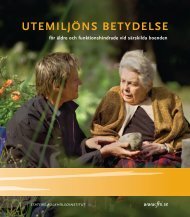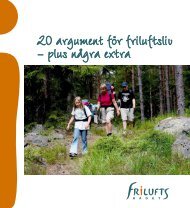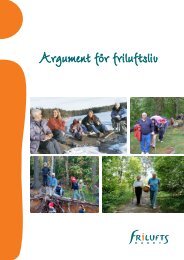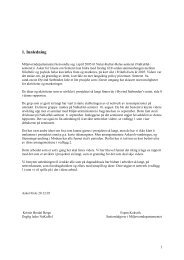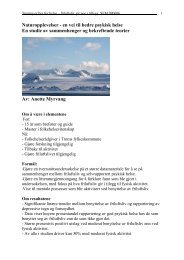Green Care: A Conceptual Framework - Frisk i naturen
Green Care: A Conceptual Framework - Frisk i naturen
Green Care: A Conceptual Framework - Frisk i naturen
Create successful ePaper yourself
Turn your PDF publications into a flip-book with our unique Google optimized e-Paper software.
2.3.2 Benefits of contact with nature<br />
There is a growing body of evidence on the positive relationship between<br />
exposure to nature (incorporating a variety of outdoor settings, from the<br />
open countryside, fields and forests, to street trees, allotments and gardens)<br />
and an individual’s health (Pretty et al, 2004, 2005a, 2005b, 2007; Peacock<br />
et al, 2007; Mind, 2007; Bird, 2007; Burls, 2007).<br />
The key message emerging is that contact with nature improves<br />
psychological health by reducing pre-existing stress levels, enhancing<br />
mood, offering both a ‘restorative environment’ and a protective effect<br />
from future stresses (Kaplan and Kaplan, 1989; Kaplan, 1995, Hartig et al,<br />
1991, 2003; Louv, 2005). Contact with nature also improves health through<br />
encouraging physical exercise, facilitating social contact and providing<br />
opportunities for personal development (Health Council of the Netherlands,<br />
2004). Research has also shown that there is a direct link between the<br />
amount of accessible local green space and psychological health (Takano et<br />
al, 2002; De Vries et al, 2003; Grahn and Stigsdotter, 2003).<br />
2.3.3 Connection and disconnection to nature<br />
In his work introducing the concept of ‘Biophilia’, Wilson suggests that<br />
our desire for connectedness to nature is innate and as powerful as other<br />
instincts. He describes “the innate tendency to focus on life and lifelike<br />
processes” (Wilson, 1984, p.1). This implies that we have an instinctive<br />
need to make contact with nature which has driven our evolution as<br />
a species. Charles Lewis, a noted horticulturalist, alludes to a similar<br />
motivation within us when he writes about the meaning of plants in our<br />
lives:<br />
“When we garden, grow plants or find tranquillity in park or<br />
forest, the ancient processes are at work within us. It is time<br />
to acknowledge them and explore their significance for our<br />
continued existence. They point the way to a new appreciation<br />
of ourselves as strands in the fabric of life woven throughout<br />
the world.” (Lewis, 1996, p. 152)<br />
Connection to nature is considered to be an important predictor of<br />
ecological behaviour and subjective well-being. Mayer and Frantz (2004)<br />
write:<br />
19




